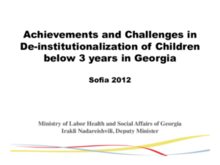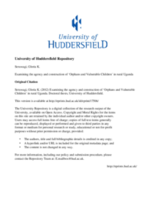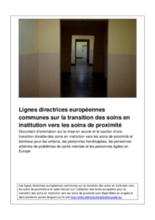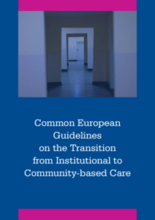Displaying 12661 - 12670 of 14348
This presentation to the 2012 Sofia Conference by Valentina Buliga, Minister of Labor in Moldova, Social Protection and Family, introduces Moldova's ongoing collaboration between the Ministry of Health and the Ministry of Labor to reduce infant mortality and the placement of children under the age of 3 in institutions.
This presentation to the 2012 Sofia conference by Irakli Nadareishvili, Deputy Minister, Ministry of Labor Health and Social Affairs of Georgia, highlights the key initiatives of the deinstitutionalization and childcare system reform launched by Georgia in 2005, as well as the challenges faced in this process.
Ce nouveau decret du President de la Republique pose les nouvelles normes et standards applicables aux centres d’accueil et de protection d’enfants en République du Bénin.
Focussing on Sheema district in rural Uganda, this study sought to give voice to ‘OVC’ and use their lived experiences to develop a robust framework of care and support.
This paper from UNICEF presents a profile of children in Cambodia, paying particular attention to those who are left behind in different spheres - education, health and nutrition, and protection - against the backdrop of society’s prevalent inequality.
The purpose of the toolkit is to assist all public authorities in Europe involved in the programming and implementation of EU Structural Funds (and other relevant funds) to make decisions which will help to improve the lives of more than a million European citizens currently living in institutional care. The toolkit aims to explain how EU funds can support national, regional and local authorities in designing and implementing structural reforms to develop quality family-based and community-based alternatives. The toolkit explicitly deals with the European Social Fund (ESF) and the European Regional Development Fund (ERDF), but it aims to apply also to the programming and implementation of the European Agricultural and Rural Development Fund (EARDF) and the Instrument for Pre-accession Assistance (IPA).
Document d’orientation sur la mise en œuvre et le soutien d’une transition durable des soins en institution vers les soins de proximité et familiaux pour les enfants, les personnes handicapées, les personnes atteintes de problèmes de santé mentale et les personnes âgées en Europe.
The Common European Guidelines on the Transition from Institutional to Community-based Care (‘the Guidelines’) provide practical advice about how to make a sustained transition from institutional care to family-based and community-based alternatives for individuals (including children) currently living in institutions and those living in the community, often without adequate support.
Hope and Homes for Children, in partnership with the Ministry of Gender and Family Promotion (MIGEPROF), has conducted a national survey of all institutions for children in Rwanda to obtain an accurate picture of the current institutional system and the children living within it which can be used to inform decision-making regarding the implementation of the reform strategy and provide a baseline against which progress can be measured in the future.
Although the relationship between child sexual abuse and mental disorders life has been well established, the health consequences of other forms of child maltreatment, including physical abuse, emotional abuse, and neglect have not been systematically examined. This study summarizes the evidence relating to the possible relationship between child physical abuse, emotional abuse, and neglect, and subsequent mental and physical health outcomes.










